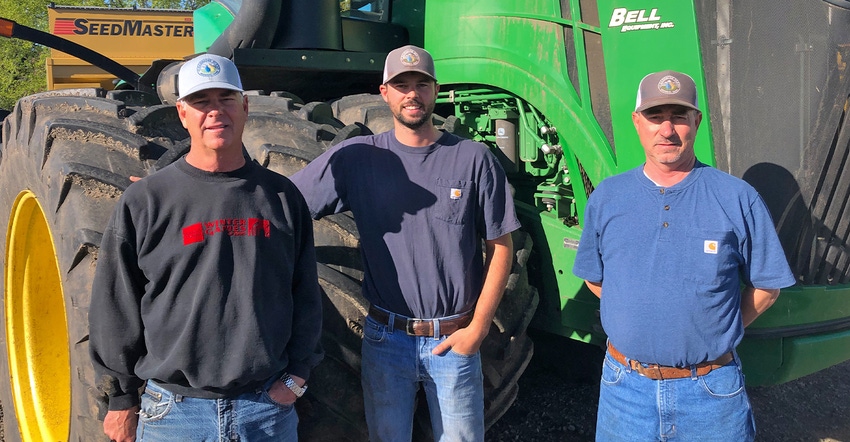May 30, 2019

Editor’s note: This is the fourth and final story in a series on ranch and farm estate planning.
By Robert Waggener
“We’re not farming for any particular year. We’re farming for the future.”
Those were the words of Steve Riggers in 2012, when Western Farmer-Stockman interviewed him and his brother, Nate, for a six-part series following the Riggers family through an entire farming season.
The two brothers, who farm in northern Idaho, talked about the importance of maintaining a balance between short-term profitability and long-term sustainability, and that focus is now playing an integral part of their succession plan.
“Three years ago, we started meeting with our accountant and attorney team, in part to figure out a way for Nate and his son, Christopher, to buy out my equity in the farm,” Steve says. “That happened in the past year, and we now have a 10-year buyout arrangement. It’s a pretty straightforward plan that takes into account my half of the equity in our farm — including equipment, the 2018 crop and the inputs that went into the 2019 crop.”
Though the plan sounds rather simplistic, none of this would have happened had Steve and Nate not labored incredibly hard, embraced change and figured out ways to work together effectively. And it would not have happened if Christopher, a recent college graduate, didn’t make it clear years ago that he wanted to work into the business.
“The idea was always to welcome Chris back to the farm. That was known pretty early,” Steve says of his nephew, who, like the two brothers, has a love for farming and a desire to succeed in the farming business.
They collectively represent the fourth and fifth generation of Riggers Clearwater Farms, which operates within the famed Camas Prairie of the Palouse, one of the most productive dryland farming areas in the country.
Diversification matters
One of the many choices Riggers family members made that has allowed them to succeed is running a highly diversified farm on 8,000 acres, most of which is leased ground. They grow winter and spring wheat, winter and spring canola, barley, chickpeas and lentils — along with grass seed, including Kentucky blue, turf-type tall fescue and reclamation varieties.
“About 15% of our farm is in grass seed production, and a combination of good yields and good prices have allowed us to stay profitable,” Steve says. “Grass seed is not connected to other drivers that determine prices for commodity crops.”
This diversification has been an important key to their succession plan. For example, Steve and Nate, like many farmers, enjoyed profitable years from 2009 to 2013, when prices for commodity crops were very good.
But when commodity prices plummeted, their profits would have tanked, too, had they not been diversified.
“The demand for grass seed across the country and in China has been really strong the past five years, just when commodity prices were going down,” Steve says. “If the business is profitable over the long term, it allows for one of the partners to go into retirement and sell his or her equity to other members of the family — in this case a brother and nephew.”
That happened late last year, when Steve became semi-retired at age 62, while younger brother Nate and his son, Christopher, solidified a plan that would allow them to purchase Steve’s share of the farm in 10 equal installments over a decade.
For the time being, Steve is keeping his interest in the deeded land, leasing it back to his brother and nephew.
This plan will give Nate and Christopher, who graduated from college in 2015 with a degree in agribusiness management, time to build more equity in the farm, while allowing Steve to spread out the tax burden over the next 10 or so years.
A retirement plan
“I have been farming ever since I was a kid. I went through the farm crisis with my father, Stanley, and my wife and I lived very frugally for many years,” Steve says. “I stuck with it and eventually had some very good years, which allowed me to reduce my debt in the farm and eventually build equity.”
Though Steve enjoys the farming lifestyle, he has always treated it as business first. He started thinking about early retirement several years ago.
“I know some farmers who have sat in the tractor seat well into their 70s and 80s. I admire that if it’s something you really want to do,” Steve says. “But I didn’t want to farm into my 70s. I wanted to enjoy fishing, skiing and playing golf while I was still young and active. I wanted more time to play the guitar, and I’m also looking forward to seeing the country with my wife, Joan.”
But to help his brother and nephew prosper, Steve has agreed to stay on as a part-time hourly employee.
“I will help during busy times of the year, including planting and harvesting. I will still work with our agronomist on field scouting, and with making decisions on the nutrient program and managing weeds,” he says.
“It’s a little bit of a weird feeling being a wage-earner now, but I like it. I can come and go as needed, and I feel good that I can help Nate and Chris succeed — because running a farm can be very stressful.”
And that became very apparent in mid-May 2019 during planting, when Steve opened the conversation by saying, “We’re really busy. We’re hot and heavy.”
You May Also Like




